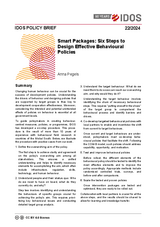Policy Brief
Smart packages: six steps to design effective behavioural policies
Pegels, AnnaPolicy Brief (22/2024)
Bonn: German Institute of Development and Sustainability (IDOS)
DOI: https://doi.org/10.23661/ipb22.2024
Changing human behaviour can be crucial for the success of development policies. Understanding the drivers of behaviour and designing policies that are supported by target groups is thus key to development cooperation effectiveness. Moreover, considering the intended and potential unintended effects of policies on behaviour is essential at all government levels.
To guide policymakers in creating behaviour-centred measures, policies, or programmes, IDOS has developed a six-step procedure. This procedure is the result of more than 10 years of experience with behavioural field research in countries of the Global South. Below, we illustrate the procedure with practice cases from our work.
- Define the overarching aim of the policy: The first step is to achieve clarity and agreement on the policy’s overarching aim among all stakeholders. This ensures a unified understanding and helps to identify necessary elements for accomplishing the aim, which often include infrastructure, regulation, skills, technology, and human behaviour.
- Understand people and their status quo: Who do we need to have on board, what do they currently do, and why? Step two involves identifying and understanding the behaviours of specific groups crucial for achieving the policy's aim. This requires prioritising key behavioural issues and conducting detailed target group analysis.
- Understand the target behaviour: What do we need them to do so we can reach our overarching aim, and why would they do it? Understanding the target behaviour involves identifying the chain of necessary behavioural steps. This requires “putting oneself in the shoes” of the target group to comprehend the behavioural process and identify barriers and drivers.
- Co-develop targeted behavioural policies with local partners to enable and incentivise the shift from current to target behaviours. Once current and target behaviours are understood, policymakers must co-develop behavioural policies that facilitate the shift. Following the COM-B model, such policies should address capability, opportunity, and motivation.
- Test and improve behavioural policies: Before rollout, the different elements of the behavioural policy should be tested to identify the most effective elements and to improve the policy accordingly. Appropriate methods include randomised controlled trials, surveys, and before-and-after comparisons.
- Scale the tested and proven policies: Once intervention packages are tested and optimised, they are ready to be rolled out.
Collaboration with local partners is crucial for all the above steps, and the results should be shared to allow for learning and knowledge transfer.
Contact
Cornelia Hornschild
Publication Coordinator
E-mail Cornelia.Hornschild@idos-research.de
Phone +49 (0)228 94927-135
Fax +49 (0)228 94927-130
Alexandra Fante
Librarian/ Open Access Coordinator
E-Mail Alexandra.Fante@idos-research.de
Telefon +49 (0)228 94927-321
Fax +49 (0)228 94927-130




![[Translate to English:] Photo: Alexandra Fante, Bibliothekarin/Open Access-Koordinatorin](/fileadmin/_processed_/f/0/csm__c_Deutsches-Institut-fuer-Entwicklungspolitik_Fante_94ce4fa1ba.jpg)